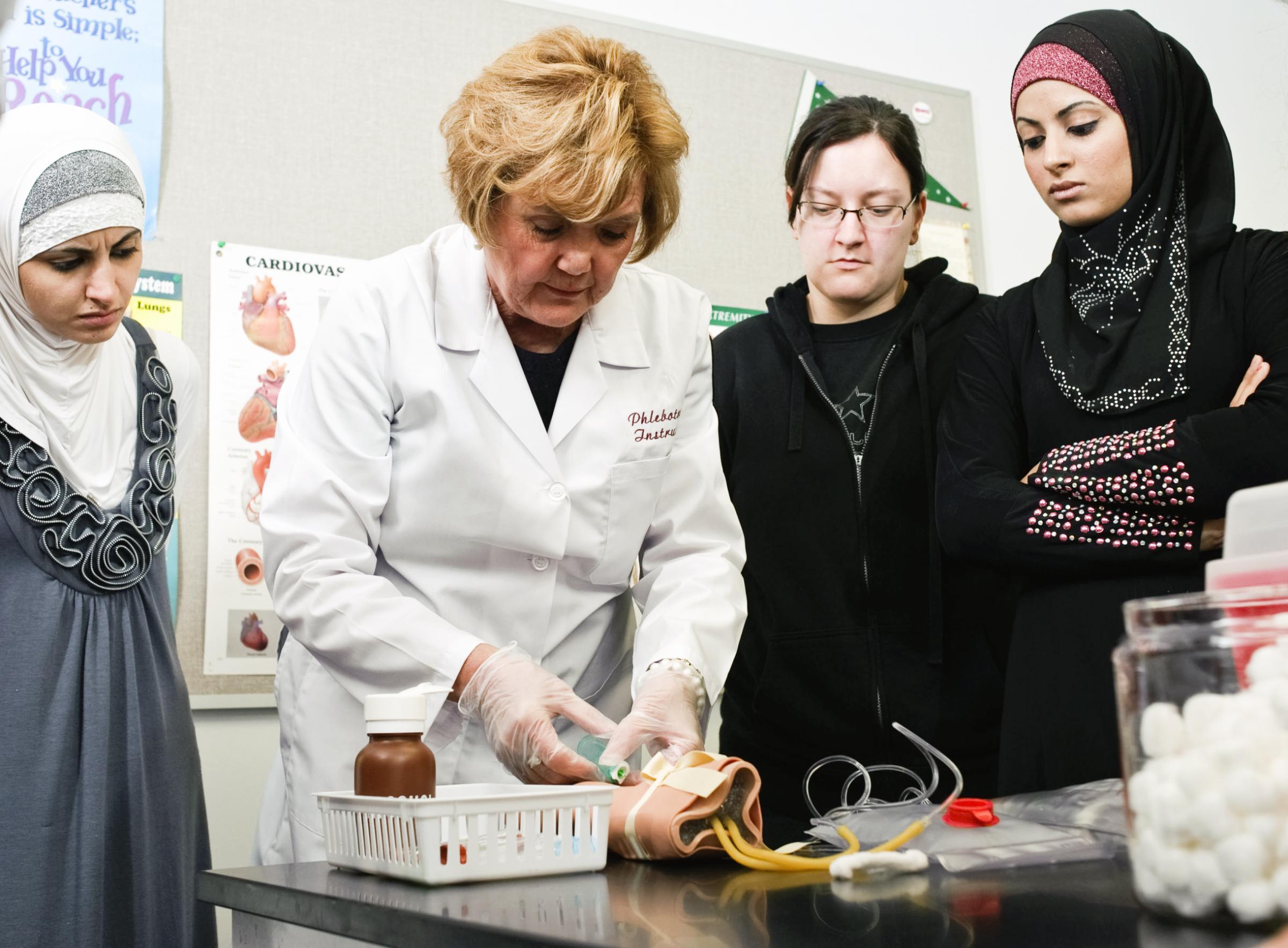Moraine Valley Retention Academy Leads to Process Improvements and Increased Student Success

Those at Moraine Valley Community College (MVCC) in Palos Hills, Illinois, believe that the measure of student success is best determined by the students themselves. With that in mind, the college’s Completion Commitment Committee implemented several initiatives, including a Retention Academy, to help students reach their goals.
Student success can be completion of a degree, but it can also be completing a class or achieving a passing grade. “Of course, when we talk about completion, we want students to earn a degree, but that’s not the only way they are successful,” said Dr. Margaret Lehner, Vice President of Institutional Advancement and Executive Assistant to the President. “Whatever the student’s goal is, if they have reached that goal, then they have been successful.”
To keep student success at the forefront, the Retention Academy was created with funding from the college’s Foundation. Applications were sought from faculty and staff who outlined their ideas to retain students and guide them to completion. Successful applicants were given the go-ahead from the committee to research past data and practices, and innovative ways to bring their ideas to fruition.
“As part of the grassroots effort, we encouraged people to become involved using their daily activities and then bring completion activities into their jobs and into the classroom so we could do some action research,” Lehner said. “We worked for about a year formulating the idea. It was a very well-thought-out process that involved initial orientation meetings, bringing in national experts, and offering mentors to each of the academy participants.”
A Retention Academy kickoff afforded an opportunity for academy scholars, including administrators, faculty, and staff, to hear guest speakers talk about the importance of retention and to learn from a student panel about obstacles that stand in their way and what they need to be successful. Academy scholars also discussed their ideas to improve retention and ways to conduct action research for their projects.
“The idea was to engage faculty and staff from a variety of departments,” said Dr. Sadya Khan, Director of Institutional Research and Planning and Co-Chair of the Completion Commitment Committee. “We wanted to give people the opportunity to showcase some of the ideas they had for retaining students, but in a very research-orientated way,” she said. Ultimately, ten projects were successfully funded.

Retention Academy Projects
Scheduling Practices
One Retention Academy project assessed current scheduling practices to determine how class scheduling can impact student retention and made suggestions for improvement. Quantitative information was gleaned from Ad Astra software and Colleague about scheduling patterns and qualitative data was gathered from Moraine Valley advisors and counselors.
“It became evident that we needed to take a very, very careful look at how we scheduled our classes—which semesters they were being offered; days of the week; and whether they were morning, afternoon, or evening classes. All of those things play a part. If you can’t build a full schedule, it means you’re hanging around [the college] longer than you need to,” Lehner said.
Findings indicated that the class schedule included more than 250 distinct meeting patterns in fall 2018. Reasons for the high number included the use of nonstandard section start/end times and day-of-the-week patterns as well as offering hybrid classes during traditional peak classroom times. “The lack of consistency in scheduling suggests it might be hard for students to develop a schedule that works for them. Students find themselves in situations where one class overlaps into two separate course periods,” said Khan.
Based on the findings, Dr. Pamela Haney, Vice President of Academic Affairs, created a Strategic Scheduling Committee to look at practices in place, and during the next academic year, consider implementing scheduling policies and practices that will be adopted by all departments to create a more standardized schedule for students.
Online Course Success
Another project focused on online courses. According to Khan, “Our online enrollment is very high and keeps increasing, but the success rates haven’t always been great.”
Some students do not fare well in an online course because they may not be ready for or don’t fully understand the rigor of an online course. The Getting Started module was added to Canvas, the college’s learning management system, to help students better prepare for online classes. The module, created with input from Moraine Valley’s online students and faculty as well as external research, taught students how to use Canvas, offered advice about time management, and provided tips for dealing with lack of preparedness.
A study of the module’s use in eleven courses showed grades improving by 6.21 percent and retention rates improving by 4.45 percent. “This is just across 11 classes,” said Dr. Kristine Christensen, co-chair of the Completion Commitment Committee, “so you can only imagine how implementing the module across hundreds of classes would make retention rates and grades even greater.” Due to the success of the module, the college plans to incorporate it into the training it provides for faculty who want to teach online courses. In addition, the Business Department will include the Getting Started module in its online business courses.
Early Alert System
“One of the barriers [to student success] is trying to balance work, life, and school, especially when you have a family, and we have such a diverse body of students. Sometimes they’re transient, so it’s hard to keep them in the mix,” Christensen said.
Another group of scholars looked at early alert systems in math and other courses and ways to offset early class withdrawals. “Sometimes a student might be having difficulty in a class and withdraws without talking to the instructor beforehand,” Christensen said. This project requires students to speak with a student support specialist or the teacher to get consent to withdraw from a class. In many instances, this plan has helped students get back on track. For example, there was an 8 percent increase in class completion from spring 2017 to spring 2018 for students who were going to withdraw early from computer science classes but decided to stay after speaking with a student support specialist.
Reading Levels and Success
A professor and Internship Coordinator for Phlebotomy and Medical Terminology looked at the success rate of students in her medical terminology classes. After poring through the statistics, she determined that students should have reading skills that enable them to, at minimum, pass the Critical Reading course to be successful in the class.
“People with that reading proficiency were 100 percent successful with grades of A, B, and C, whereas people who didn’t fare well in reading classes didn’t do as well. It is unfair to put students in that class if they aren’t prepared,” Christensen said.
For instance, in Medical Terminology, a foundation course serving as either a prerequisite or a corequisite for every Allied Health program at Moraine Valley, approximately 24 percent of the students failed the final exam during the fall 2016 and spring 2017 semesters. Of those, 46 percent earned a D or an F in the class. Data suggest that the higher a student scored in the Critical Reading course, the greater was his or her likelihood of comprehending and recalling medical terms and demonstrating that knowledge on the exam. A recommendation has been made to the Curriculum Review and Curriculum Development teams to add the Critical Reading course as a prerequisite for the next academic year.
What Now?
These projects helped Moraine Valley dig deeper into specific institutional challenges. “In various ways, each of the projects was tremendously successful in helping us chart new territory,” Lehner said. She continued,
If we can get more faculty to do quantitative and qualitative research projects in their classroom and more staff to take a look at what they are doing that supports students, I think we can have tremendous impact. The whole idea is getting everyone in and out of the classroom to do whatever they need to do, whatever it takes, to help their students to be successful. We want faculty and staff to have a concept, undertake action research, and be able to measure the results to help determine if we need to go in another direction. All of this is valuable and will help us to know what we should, and should not, be doing for our students.
Future plans include securing additional feedback from academy scholars, engaging more faculty in action research, and continuing to meet with Curriculum Development and Review committees with suggestions for enhancements. Results will be shared with faculty and staff at the college’s fall 2019 Staff Development Day.
Jodi Marneris is a writer in the Marketing and Communications Department at Moraine Valley Community College in Palos Hills, Illinois.
Opinions expressed in Innovation Showcase are those of the author(s) and do not necessarily reflect those of the League for Innovation in the Community College.










